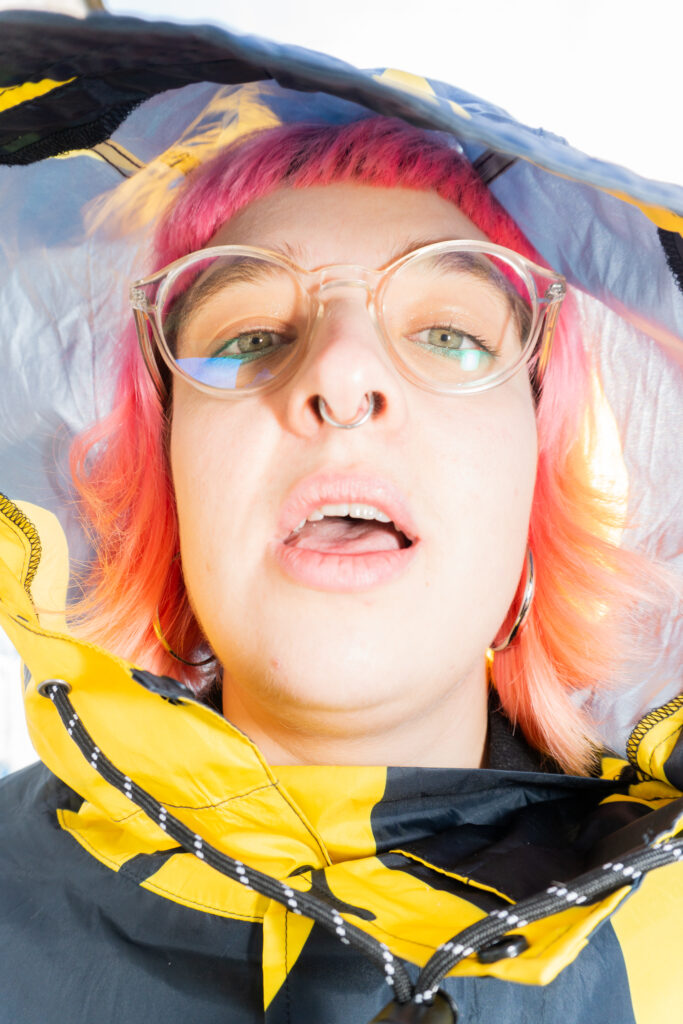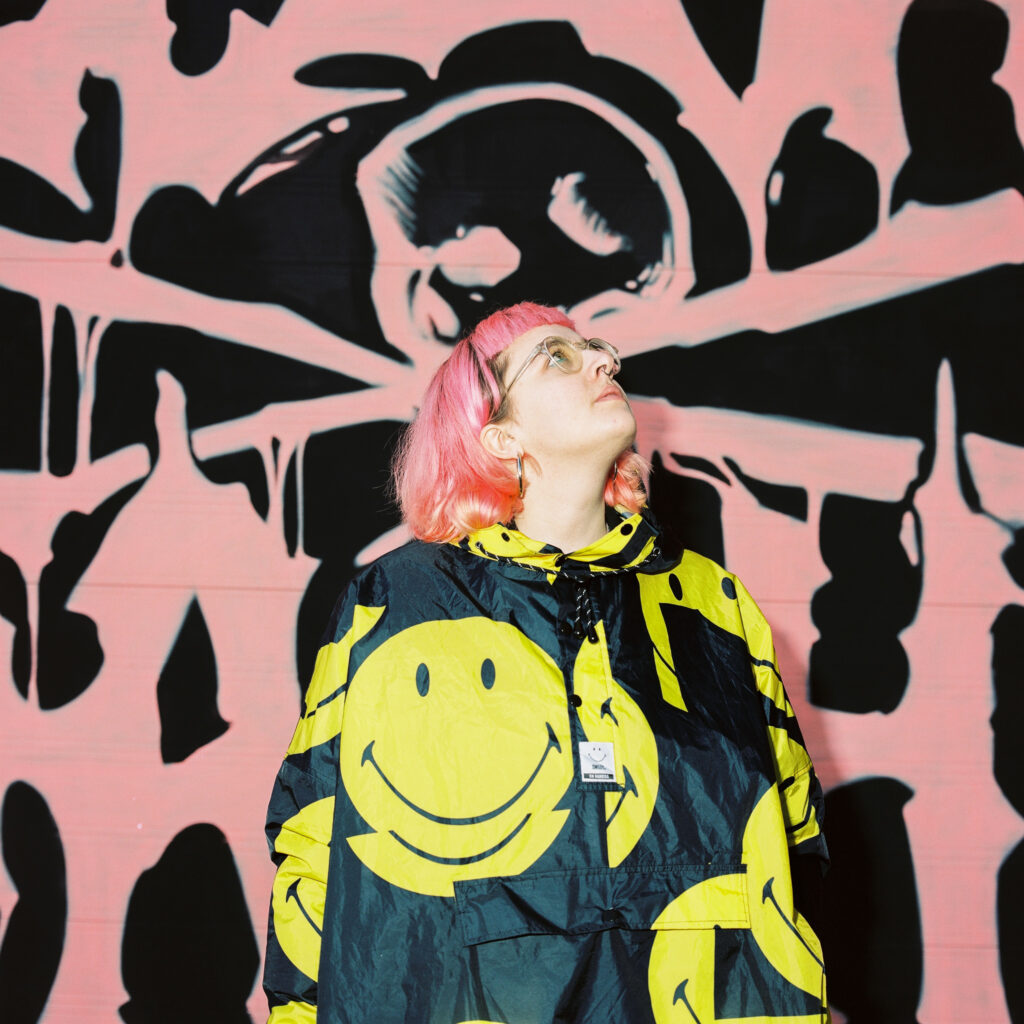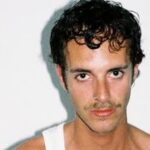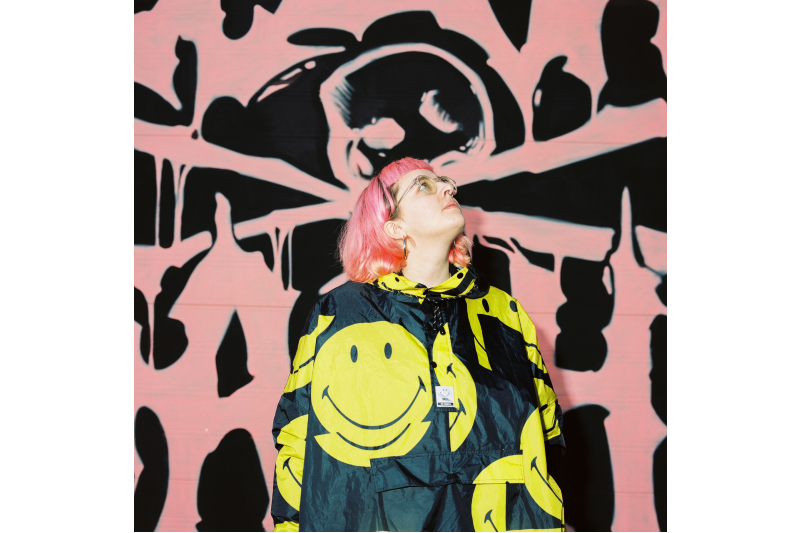We caught up with Canadian-born DJ Melissa Juice to talk about music and life in Brussels.
We’re lucky to have you on this side of the pond! How did Brussels find you (how did you find Brussels)?
When I moved to Belgium from Canada about 6 years ago, I didn’t think I would stay, but I ended up discovering a truly wonderful scene here in Brussels especially for electronic music and nightlife – it was explosive! There were so many things happening in quite a small city.
I fell in love with Brussels and my career just kicked off and it’s been going pretty well. I feel as if everything happened so fast. Everything happened in two years which is crazy because it feels much longer.
How did you start playing around Brussels?
When I came to Brussels my first real proper public set was for the very first edition of Mothers and Daughters at Beursschouwburg and I was doing the opening slot at 6pm before a huge line-up that included Soumaya Pheline, Princess Century and Planningtorock!
I remember being this baby DJ, playing on CDJs for the very first time. Even though there were only one or two people there while I was playing, it was monumental for me and it went very well.
Then, I started doing small queer parties and events, squats and bars including the Crazy Circle – which became my little spot because it was the ONLY permanent lesbian bar in the city.
Soon after, I was playing larger, more nightlife-oriented events, where people from outside the queer scene started to take notice.
How would you explain your musical style?
Like most of us, I started listening to pop music on the radio and, once I discovered the queer scene, got into queer pop with a more electronic flavour. That progressed into exploring different genres and different electronic music.
Over the last two years, my style has evolved to more refined, selector-style electronic stuff with a bigger focus on production.
The hardest and most important thing about my mixing is that I have kind of promised myself that I will never play what I think people want to hear. As soon as I do that, I don’t enjoy the mix as much and it shows. That’s why I end up playing very niche, complex DJ shit and then follow it up with a Spice Girls Remix because that’s my style.
At the same time, I’ve started discovering the incredible electronic music history of Belgium – one of the birthplaces of New Beat and Techno.
Most recently I’ve finally realised that the once-mainstream club music that I used to listen to when I was 16 is now old enough that I can bring it back. It’s so exciting to play Benny Benassi and Paul Van Dyk again, but I also love acid, trance and weird ‘progressive’ (the good ‘progressive’) stuff.
I am just so happy to be at a point in my career where I am being booked for events that celebrate my style and I get to do what I feel in the moment.
Which Brussels artists and artistic collectives inspire you the most?
I know it might sound cheesy but most of the people that I look up to in the Brussels scene are my friends. People who are doing the same thing that I am doing. People who are ridiculously talented, hardworking, humble and are very often not getting the recognition that they deserve.
I think that my first real idol in Brussels was Azo because she’s queer, her selection is insane, she is very technically skilled, and she is a perfectionist which speaks to me. Also, Gay Haze has been such an inspiration so now that I’m working with them and Diego (Fais Le Beau), it feels like a dream.
I also look up to a lot of my friends who run other small collectives such as Not Your Techno, Deep Down East, Radio Vacarme, while I have also gained a lot of respect for all the hard-working people behind the scenes who make parties happen and more often than not neither get the credit nor recognition that they deserve.
On top of being a fabulous DJ, you are a vocal queer activist and feminist. If at all, how can both queer and straight parties and spaces be more inclusive and respectful one towards another?
In the queer scene we tend to gate-keep queerness due to pain and rejection and the fear of opening up and there’s always a question of are you queer enough – in terms of clothes, relationship structure, values and that can be frustrating, but I understand where it comes from.
We, as queer people, have been through a lot, and as much as you want to be inclusive when it comes to parties, sometimes, all we need is a ‘safe space.’
I did a week of workshops hosted by Horst & Nachtplan in Leuven where we talked about safety, politics, event structure – and the concept of braver spaces rather than safer spaces came up because “safe space” is being used everywhere now and it means different thing to different people, venues, and events. To some places it just means having a poster saying ‘Don’t put drugs in peoples’ drinks.’, while to others it means having large care teams, spaces and resources available to the public, but I think this brave space idea is really important.
I’ve met Nadine – who organises a queer party in London called Pxssy Palace – and she spoke about events in three forms: The first one would be closed events for queer people by queer people who need a safe space where they can feel at home. The second one would be mixed – queer parties open to allies – which for me is the definition of the brave space, and the third one is the fully open party open to everybody.
Pxssy Palace is also great because it is at its core an event for queer people of colour, but is technically open to everybody, with a condition of a sliding scale for ticket prices – where white straight men pay £100 pounds, for example. No one is barred, you just have to pay more according to your privilege – which kind of helps the public regulate itself.
What could Brussels do better for the queer community and for the party community?
Financial accessibility to parties to LGBTQI+ youth is something that I often think about. When you think about it, if you are a 20-year-old queer kid and the club entrance costs €25-plus, you probably won’t be able to afford to go and will miss out on the club experience. Meanwhile, there are large parties and festivals all over the world, mostly queer ones, that offer free or discounted fees to people with social and financial obstacles. While lots of small events in Brussels do this, it’s very rare at the big venues.
What should we be expecting from Melissa Juice in the coming months?
I used to think it was impossible that I would ever play at clubs like Fuse or C12 and now I’m so incredibly grateful to play there. My next big dream would be to collaborate with and play at queer parties outside of Belgium, but before that I am really looking up to playing at Listen Festival during their 27-hour rave.
Among other parties in Brussels, make sure to catch Melissa Juice playing b2b with Spirite at Fuse 25/03 alongside Freddy K, Jeroen Search, Rebecca Delle Piane, Border One, Spray and DC Salas. Catch her as well at Listen Festival (29.03. – 02.04.) and Paradise City (30.06 – 02.07.)
Follow Melissa Juice on Instagram


You may also like
-

Adriano Selva: The Soulful Pop Dreamer Who Feels It All
In a world that often rewards detachment, Adriano Selva chooses to stand beautifully exposed. His
-

Splinters of Joy: Lylybeth Merle’s Eco‑Queer Fairy Tale of Transition and Healing
Lylybeth Merle’s new book Échardes (“Splinters”), out in February 2026, is a tender, defiant journey through gender,
-

Music, Books and Brussels: A Conversation with Elliot Ibouzidene
Meeting artist Elliot Ibouzidene to talk about music, literature and his “unwritings” of Athens and Copenhagen, in
-

Renee Nicole Good: Community Mourns the Loss of a Queer Mother, Poet, and Advocate for Compassion
Renee Nicole Good, a 37‑year‑old queer writer and mother of three, was killed on Wednesday
-

The Bloemardin: Brussels’ Forgotten Rebel Spirit
If you’ve ever wandered past Brussels City Hall, you might have noticed a small statue

